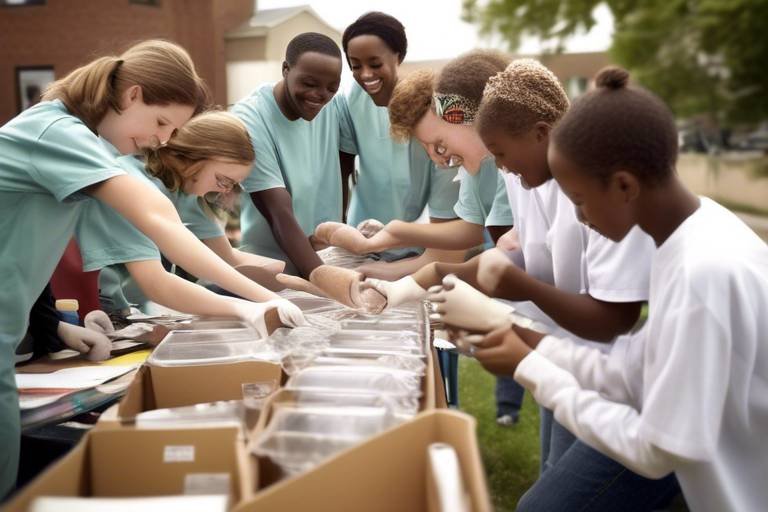The Science of Volunteerism - Benefits for Community and Self
Volunteerism is not just a selfless act; it’s a powerful force that can transform both communities and individuals. When you think about it, volunteering is like planting a seed in a garden. With time, care, and nurturing, that seed grows into something beautiful and impactful. This article explores the multifaceted benefits of volunteerism, shedding light on how giving back fosters social connections, enhances personal growth, and contributes to a healthier society. Whether you're looking to make a difference in your community or seeking personal fulfillment, the benefits of volunteering are profound and far-reaching.
Engaging in volunteer work can significantly improve mental health. Studies have shown that altruism promotes happiness, reduces stress, and fosters a sense of purpose in individuals. When you volunteer, you often experience a rush of positive feelings, sometimes referred to as the "helper's high." This phenomenon occurs because volunteering triggers the release of endorphins, the brain's feel-good chemicals. Imagine how fulfilling it is to know that your actions are making a difference! It’s like finding a treasure chest filled with joy and satisfaction, just waiting to be unlocked with every good deed you perform.
Volunteers play a crucial role in strengthening communities. Their collective efforts can address local issues, enhance social cohesion, and build a more resilient society. When you volunteer, you're not just giving your time; you're investing in the fabric of your community. Think about it: every hour spent helping others is an hour spent building bridges, creating connections, and fostering relationships. This sense of belonging and community spirit can lead to a more supportive environment, where individuals feel empowered to work together towards common goals.
Examining real-life examples of impactful volunteer initiatives illustrates their potential to create lasting change. Consider the "Food Not Bombs" project that feeds the hungry in urban areas. By mobilizing volunteers, this initiative not only addresses food insecurity but also brings together diverse groups of people who share a common goal. Such projects showcase how dedicated volunteer efforts can transform communities, proving that when people unite for a cause, they can create waves of positive change.
Environmental volunteerism is another exciting avenue for those looking to make a difference. Opportunities abound for individuals to engage in activities like clean-up drives, tree planting, and wildlife conservation. By participating in these initiatives, not only do volunteers contribute to sustainability, but they also enhance their connection to nature. Imagine being part of a team that plants trees in a deforested area, knowing that your efforts will benefit generations to come. It’s a beautiful reminder of how interconnected we all are with our planet.
Volunteering in health-related initiatives not only aids communities but also promotes personal health. Whether it's working in a hospital, assisting at health fairs, or supporting mental health organizations, volunteers can have a profound impact on public health. Moreover, research has shown that volunteering in healthcare settings can lead to improved physical and mental well-being for volunteers themselves. It’s like a two-for-one deal: you help others while also enhancing your own life. The sense of fulfillment and purpose derived from aiding those in need can significantly boost your mood and outlook on life.
Volunteering offers unique opportunities for personal development. It’s not just about giving your time; it’s also about acquiring new skills and experiences that can enhance your resume. From learning leadership skills to gaining hands-on experience in various fields, volunteering can be a fantastic way to explore new interests and build your professional network. Think of it as a workshop for life skills—where every task completed adds a new tool to your toolkit. Whether you’re organizing events, managing projects, or working directly with the community, each experience can set you on a path to personal and professional growth.
Understanding volunteerism from a global perspective reveals its diverse cultural significance. Different societies engage in volunteering in unique ways, reflecting their values and priorities. For instance, in some cultures, community service is woven into the fabric of daily life, while in others, it may be more formalized through organizations and programs. Regardless of the approach, the underlying principle remains the same: volunteering enriches both the giver and the receiver.
The growing trend of international volunteerism allows participants to immerse themselves in new cultures while making a positive impact. Programs that facilitate volunteer work abroad not only help communities in need but also foster global understanding and cooperation. Imagine traveling to a different country and contributing to local projects while learning about another culture firsthand. It’s an adventure that broadens your horizons and creates lasting memories.
When comparing local and global volunteer opportunities, it’s essential to consider your skills and interests. Local volunteering often allows for a more immediate impact and connection with your community, while global volunteering can offer unique experiences and the chance to make a difference on a larger scale. Both approaches have their advantages and challenges, so it’s important to choose the right fit for you.
- What types of volunteer opportunities are available? There are countless options, ranging from environmental projects to healthcare initiatives and community service programs.
- How much time do I need to commit to volunteering? Volunteer commitments can vary widely. Some projects may require a few hours a week, while others may be more intensive.
- Can volunteering help me in my career? Absolutely! Volunteering can provide valuable skills, experiences, and networking opportunities that enhance your resume.
- Is there an age limit for volunteering? Many organizations welcome volunteers of all ages, though some may have specific age requirements for certain roles.

The Psychological Benefits of Volunteering
Engaging in volunteer work is more than just a kind gesture; it can be a transformative experience that significantly enhances mental health. Numerous studies show that when individuals dedicate their time and skills to help others, they often experience a profound sense of happiness and fulfillment. It's almost like a natural high! Just think about it: when you see the smiles on the faces of those you’ve helped, it creates an emotional boost that’s hard to replicate through other means. This altruistic behavior promotes a sense of belonging and purpose, which are crucial elements for maintaining mental well-being.
One of the most compelling psychological benefits of volunteering is its ability to reduce stress. In our fast-paced world, stress can feel like an unwelcome companion. However, volunteering provides an escape from daily pressures. By focusing on the needs of others, volunteers often find that their own worries fade into the background. It’s like taking a mental vacation! This shift in focus can lead to lower levels of anxiety and depression. Moreover, the social connections formed during volunteer activities can create a support network that further alleviates feelings of isolation.
Additionally, volunteering fosters a sense of purpose. Many people struggle with feelings of aimlessness, especially during transitional phases in life. When you volunteer, you contribute to something larger than yourself, which can reignite your passion and motivation. It’s a reminder that your actions can make a difference, no matter how small. This sense of purpose is often linked to improved self-esteem and life satisfaction. In fact, a study conducted by the Corporation for National and Community Service found that individuals who volunteer regularly report higher levels of happiness and life satisfaction compared to those who do not.
Furthermore, volunteering can be a powerful tool for personal growth. When you step out of your comfort zone to help others, you often discover new strengths and abilities within yourself. Whether it's learning how to lead a project, communicate effectively with diverse groups, or even develop new skills, the opportunities for growth are endless. This experience not only enhances your resume but also boosts your confidence. It’s like leveling up in a video game; each volunteering experience adds new skills to your arsenal!
To sum it up, the psychological benefits of volunteering are vast and varied. From reducing stress and anxiety to enhancing self-esteem and providing a sense of purpose, the act of giving back can lead to a more fulfilling life. So, why not consider volunteering? You might just find that in helping others, you help yourself even more.
- How does volunteering improve mental health?
Volunteering can reduce stress, promote happiness, and provide a sense of purpose, all of which contribute to better mental health. - Can volunteering help with anxiety and depression?
Yes, many individuals report lower levels of anxiety and depression after engaging in volunteer work due to the social connections and sense of achievement it fosters. - What skills can I gain from volunteering?
Volunteering can help you develop leadership skills, communication skills, and even technical skills, depending on the type of work you do.

Community Impact of Volunteerism
Volunteerism is more than just a noble act; it's a powerful catalyst for change that can uplift entire communities. When individuals come together to lend a hand, they not only address immediate needs but also foster a sense of belonging and unity among residents. Imagine a neighborhood where everyone knows each other, where people are willing to help their neighbors, and where local issues are tackled collaboratively. This is the essence of volunteerism—creating a vibrant community fabric that thrives on cooperation and goodwill.
One of the most significant impacts of volunteerism is its ability to strengthen social ties. When people volunteer, they often work alongside others who share similar passions and interests. This shared experience can lead to lasting friendships and connections that extend beyond the volunteer project. For instance, community clean-up events not only beautify the area but also bring together diverse groups of people, fostering a sense of camaraderie and mutual respect. As these bonds grow, they create a network of support that can be invaluable during times of crisis.
Moreover, volunteers play a crucial role in addressing local issues. Whether it's organizing food drives for the less fortunate, tutoring children, or providing support for the elderly, volunteers help fill gaps that often exist in community services. For example, a recent study showed that communities with active volunteer programs reported a 30% decrease in homelessness over five years. This statistic illustrates how volunteerism can lead to tangible improvements in societal challenges.
Additionally, volunteerism enhances social cohesion. When individuals engage in volunteer work, they learn to appreciate the diverse backgrounds and perspectives of their fellow community members. This exposure promotes understanding and tolerance, which are essential for a harmonious society. To illustrate this, consider a local food bank that serves a diverse population. Volunteers from various walks of life come together to support the mission, creating an environment where cultural exchange flourishes. As they work side by side, they break down barriers and build a more inclusive community.
To further emphasize the impact of volunteerism, let’s take a look at some remarkable statistics:
| Impact Area | Statistic |
|---|---|
| Reduction in Crime Rates | 25% decrease in neighborhoods with active volunteer programs |
| Community Engagement | 40% of volunteers reported feeling more connected to their community |
| Health Benefits | Volunteers experience a 20% decrease in depression symptoms |
In conclusion, the community impact of volunteerism is profound and far-reaching. It not only addresses immediate needs but also lays the groundwork for a more connected and resilient society. As individuals come together to support one another, they create a ripple effect that benefits everyone involved. So, why not take the leap and get involved? Whether it's through a local charity or a community event, your contribution can make a world of difference.
- What is volunteerism? Volunteerism is the act of offering your time and skills to help others without expecting monetary compensation.
- How does volunteering benefit me? Volunteering can improve your mental health, enhance your skills, and expand your social network.
- Can I volunteer if I have a busy schedule? Absolutely! Many organizations offer flexible volunteering opportunities that can fit into your schedule.
- What types of volunteer opportunities are available? There are countless options, including environmental projects, health initiatives, and community service programs.

Case Studies of Successful Volunteer Projects
When we think about volunteerism, it’s easy to picture a group of people picking up trash in a park or serving food at a local shelter. However, the impact of volunteer projects extends far beyond these immediate actions. Let's dive into some compelling case studies that demonstrate how dedicated volunteers have transformed their communities and created lasting change.
One remarkable example comes from the “Community Garden Initiative” in Detroit, Michigan. This project was born out of a need to address food insecurity in urban neighborhoods. Volunteers, ranging from local residents to college students, came together to transform vacant lots into thriving community gardens. Not only did this initiative provide fresh produce to families in need, but it also fostered a sense of community pride and ownership. Participants reported increased social interactions and a stronger bond with their neighbors, illustrating how a simple act of gardening can cultivate more than just vegetables.
Another inspiring project is the “Books for Kids” program in San Francisco. This volunteer-driven initiative aims to improve literacy among underprivileged children. Volunteers gather to read to kids, organize book drives, and create engaging reading environments in schools. The results have been astounding: reading levels have increased significantly among participants, and many volunteers have found a renewed sense of purpose through their interactions with the children. This case highlights how volunteering can not only uplift a community but also enrich the lives of those who give their time.
To further illustrate the diversity of volunteer projects, consider the “Clean Oceans” campaign, which has seen volunteers from various backgrounds come together to tackle marine pollution. This initiative organizes beach clean-ups, educational workshops, and advocacy for sustainable practices. Volunteers have not only removed tons of waste from coastlines but have also engaged in meaningful conversations about environmental conservation. The ripple effect of this project is profound, as it inspires participants to adopt eco-friendly habits in their daily lives, proving that volunteerism can lead to a more sustainable future.
These case studies demonstrate the power of collective action in addressing local challenges. Each project showcases unique approaches to volunteerism, yet they all share a common thread: a commitment to making a difference. The impact of these initiatives goes beyond the immediate benefits; they foster social connections, enhance community resilience, and empower individuals to take ownership of their environment.
In conclusion, successful volunteer projects not only address pressing community issues but also create a sense of belonging and purpose among volunteers. As we explore these initiatives, it’s clear that the act of giving back is a catalyst for change, inspiring others to join in and amplify the positive effects of volunteerism.
- What are the primary benefits of volunteering? Volunteering can improve mental health, foster social connections, and enhance personal growth while benefiting the community.
- How can I find volunteer opportunities in my area? Websites like VolunteerMatch and local community centers often list available opportunities tailored to your interests.
- Can volunteering help me build skills for my career? Absolutely! Many volunteer roles provide valuable experience and skills that can enhance your resume.
- Is there a time commitment for volunteering? Time commitments vary greatly depending on the organization and project. It's best to discuss this with the volunteer coordinator.

Environmental Volunteerism
When we think about the environment, it’s easy to feel overwhelmed by the challenges we face, from climate change to pollution. However, offers a beacon of hope—a way for individuals to make a tangible difference in their communities and beyond. By engaging in activities that promote sustainability, volunteers not only contribute to the health of our planet but also cultivate a deeper connection to nature. Imagine spending a Saturday morning planting trees or cleaning up a local park; these actions not only beautify our surroundings but also foster a sense of community and shared purpose.
One of the most rewarding aspects of environmental volunteering is the variety of opportunities available. From beach clean-ups to wildlife conservation projects, there’s something for everyone. Participants can choose initiatives that resonate with their passions, whether it’s protecting marine life or restoring local habitats. This hands-on experience not only enhances environmental awareness but also empowers individuals to be advocates for change. The feeling of picking up trash on a beach and seeing the immediate impact of your efforts can be incredibly fulfilling.
Moreover, environmental volunteerism serves as a powerful reminder of our collective responsibility. When groups come together to tackle environmental issues, they create a ripple effect that can inspire others to join in. For instance, a community garden project can spark interest in sustainable agriculture and encourage residents to grow their own food, reducing their carbon footprint. The table below illustrates some popular environmental volunteer activities and their benefits:
| Activity | Benefits |
|---|---|
| Tree Planting | Improves air quality, enhances biodiversity, and provides shade. |
| Beach Clean-Ups | Reduces marine pollution, protects wildlife, and promotes community pride. |
| Wildlife Conservation | Preserves endangered species, restores habitats, and educates the public. |
In addition to the environmental benefits, volunteering in these areas can also lead to personal growth. Many volunteers report feeling a stronger sense of purpose and satisfaction from their involvement. It’s an opportunity to meet like-minded individuals who share a passion for the environment, fostering friendships that can last a lifetime. Plus, the skills gained through these experiences—such as teamwork, leadership, and problem-solving—can be invaluable in both personal and professional contexts.
As we navigate the complexities of modern life, it’s essential to remember that every small action counts. Whether you’re picking up litter on a hike or advocating for policy changes, your efforts contribute to a larger movement toward sustainability. So, the next time you consider how to spend your free time, why not dive into the world of environmental volunteerism? You just might find that it enriches your life in ways you never anticipated.
Q: What types of environmental volunteer opportunities are available?
A: Opportunities range from tree planting and wildlife conservation to clean-up drives and community gardening. Many organizations offer diverse programs to suit various interests.
Q: How can I find local environmental volunteer projects?
A: Websites like VolunteerMatch, local community centers, and environmental organizations often list upcoming volunteer opportunities in your area.
Q: Do I need specific skills to volunteer for environmental projects?
A: While some projects may require specific skills, many welcome volunteers of all experience levels. The most important qualities are enthusiasm and a willingness to learn!

Health and Wellness Programs
Volunteering in health and wellness programs is not just about giving back; it's a unique opportunity that can significantly enhance both community well-being and personal health. When individuals engage in these initiatives, they often find themselves at the intersection of altruism and self-improvement. Imagine walking into a community center and seeing a group of people working together to organize health fairs, provide free screenings, or conduct fitness classes. This is where the magic happens! Not only are volunteers making a direct impact on the health of their community, but they're also reaping the benefits of improved physical and mental well-being.
One of the most compelling aspects of volunteering in health-related programs is the profound sense of purpose it instills. When you help others, you often find that your own worries and stresses seem to fade away. This phenomenon is supported by various studies that suggest volunteering can lead to lower rates of depression and anxiety. It's like a natural mood booster! Furthermore, participating in health initiatives allows volunteers to learn about wellness practices, nutritional information, and fitness strategies that they can apply to their own lives.
Additionally, volunteering in health and wellness programs often involves working alongside professionals in the field. This exposure not only provides valuable insights into the healthcare system but also allows individuals to develop new skills. For instance, volunteers may learn how to conduct basic health assessments, facilitate wellness workshops, or even manage community health events. These experiences can be incredibly beneficial for those considering a career in healthcare or related fields.
Moreover, the impact of these programs extends beyond individual benefits. When communities come together to focus on health, the collective outcomes can be astounding. Programs that promote physical activity, mental health awareness, and nutritional education can lead to healthier lifestyles and a decrease in chronic diseases. For example, community gardens not only provide fresh produce but also serve as a gathering place for neighbors, fostering social connections and a sense of belonging.
| Program Type | Description | Volunteer Roles |
|---|---|---|
| Health Fairs | Events offering free health screenings and information. | Organizers, health educators, and support staff. |
| Fitness Programs | Classes designed to promote physical activity. | Instructors, assistants, and event coordinators. |
| Mental Health Workshops | Sessions focused on mental wellness and coping strategies. | Facilitators, outreach coordinators, and support personnel. |
In conclusion, volunteering in health and wellness programs is a win-win situation. Not only do volunteers contribute to the betterment of society, but they also enhance their own health and well-being in the process. So, if you’re looking for a way to make a difference while also enriching your own life, consider diving into the world of health and wellness volunteerism. It's a journey that promises to be rewarding both for you and the communities you serve.
1. How can I find health and wellness volunteer opportunities in my area?
Many local hospitals, community centers, and non-profit organizations offer volunteer programs. Websites like VolunteerMatch and Idealist can also help you locate opportunities based on your interests and location.
2. Do I need any special qualifications to volunteer in health programs?
While some programs may require specific qualifications, many welcome volunteers from all backgrounds. Basic training is often provided, making it accessible for everyone.
3. Can volunteering in health programs help with career development?
Absolutely! Volunteering can provide hands-on experience, networking opportunities, and valuable skills that can enhance your resume, especially if you are pursuing a career in healthcare.
4. What are the time commitments for volunteering in health and wellness programs?
Time commitments vary by program. Some may require a few hours a month, while others might need a more significant time investment. It's best to discuss your availability with the organization.

Building Skills Through Volunteering
Volunteering is much more than just giving your time; it’s an incredible opportunity for personal growth and skill development. When you dive into volunteer work, you’re not only helping others but also embarking on a journey that can enhance your own life in ways you might never have imagined. Think of it as a treasure chest of experiences waiting to be unlocked, where each activity you engage in adds a new tool to your personal toolbox.
One of the most significant benefits of volunteering is the chance to develop new skills. Whether you’re working with a nonprofit organization, participating in a community event, or offering your expertise in a specific area, you’re likely to encounter challenges that require you to think critically and adapt. For example, if you volunteer to organize a fundraising event, you might find yourself learning about budgeting, marketing, and event planning—all valuable skills that can enhance your resume.
Moreover, volunteering often places you in a collaborative environment. This teamwork aspect allows you to hone your communication and interpersonal skills. You’ll learn how to effectively express your ideas, listen actively to others, and work towards common goals with people from diverse backgrounds. These skills are not only crucial in professional settings but also enrich your personal relationships.
Additionally, volunteering can provide you with the chance to explore different fields or industries. If you’re considering a career change or trying to figure out what you’re passionate about, volunteering can serve as a testing ground. For instance, if you’re interested in education, volunteering as a tutor or mentor can give you firsthand experience and insight into the field. You might discover that teaching is your calling, or you might learn that it’s not quite what you expected—either way, you gain clarity.
Let’s not forget about the leadership opportunities that arise through volunteering. Many organizations look for volunteers to take on leadership roles, whether it’s coordinating a project or leading a team. These experiences can be invaluable, teaching you how to motivate others, manage a project from start to finish, and navigate the complexities of group dynamics. In essence, volunteering can be a crash course in leadership that you might not find in a traditional classroom setting.
Here’s a quick overview of some skills you can build through volunteering:
| Skill | Description |
|---|---|
| Communication | Learn to articulate ideas and listen effectively. |
| Leadership | Gain experience in leading teams and managing projects. |
| Problem-Solving | Develop critical thinking skills by tackling real-world challenges. |
| Networking | Build connections with like-minded individuals and professionals. |
| Time Management | Improve your ability to prioritize tasks and meet deadlines. |
In conclusion, volunteering is a powerful way to build skills that can transform your personal and professional life. It’s about much more than just giving back; it’s about investing in yourself. So, the next time you consider volunteering, remember that you’re not just helping others—you’re also paving the way for your own growth and success.
Q1: What types of skills can I gain from volunteering?
A1: You can gain various skills, including communication, leadership, problem-solving, networking, and time management, depending on the type of volunteer work you engage in.
Q2: How can volunteering enhance my resume?
A2: Volunteering demonstrates your commitment to community service, showcases your skills, and provides real-world experience that employers value.
Q3: Is volunteering a good way to explore new career paths?
A3: Absolutely! Volunteering allows you to try out different roles and industries, helping you discover your passions and interests.

Volunteerism Across Different Cultures
Volunteerism is a universal concept, yet its expression varies dramatically from one culture to another. In some societies, volunteering is deeply embedded in religious or spiritual practices, while in others, it is seen as a civic duty or a means of social engagement. This rich tapestry of volunteerism not only highlights the diverse ways in which people give back to their communities but also reflects the unique values and traditions of each culture.
For instance, in many Indigenous cultures, volunteering is often linked to the concept of community stewardship. Individuals may participate in activities such as land restoration or cultural preservation, which are seen as vital to maintaining their heritage and supporting future generations. This approach emphasizes a collective responsibility, where the well-being of the community is prioritized over individual gain.
In contrast, Western cultures often frame volunteerism within the context of personal development and skill acquisition. Many people engage in volunteering as a way to enhance their resumes or gain experience in a particular field. This perspective can sometimes lead to a transactional view of volunteer work, where the focus shifts from altruism to self-benefit. However, the underlying motive remains the same: a desire to contribute to society.
Moreover, the rise of global communication and travel has fostered a new wave of international volunteerism. Programs that allow individuals to volunteer abroad have gained popularity, offering participants a chance to immerse themselves in different cultures while making a positive impact. This experience can be transformative, as it encourages a greater understanding of global issues and fosters cross-cultural friendships. For example, a volunteer from the United States might work on education initiatives in a rural village in Africa, gaining insights into the challenges faced by that community while also sharing their own knowledge and skills.
To better understand the nuances of volunteerism across cultures, consider the following table that outlines key differences:
| Culture | Volunteerism Focus | Common Activities |
|---|---|---|
| Indigenous Cultures | Community Stewardship | Land restoration, cultural preservation |
| Western Cultures | Personal Development | Skill-building workshops, internships |
| Asian Cultures | Family and Community | Local festivals, charity events |
| African Cultures | Collective Welfare | Health initiatives, education programs |
As we can see, volunteerism is not a one-size-fits-all endeavor. Each culture brings its own values and practices to the table, shaping how individuals engage with their communities. This diversity enriches the global landscape of volunteerism, allowing for a more comprehensive understanding of social responsibility and community engagement.
In conclusion, whether through local initiatives or international programs, volunteerism serves as a bridge connecting people across cultures. It fosters understanding, compassion, and collaboration, proving that no matter where we come from, we all share a common goal: to make our world a better place.
- What is volunteerism? Volunteerism is the practice of offering time and skills to help others without expecting monetary compensation.
- How can I get involved in volunteering? You can start by researching local organizations or international programs that align with your interests and skills.
- What are the benefits of volunteering? Volunteering can enhance your mental well-being, build skills, and strengthen community ties.
- Is volunteering only for certain age groups? No, volunteering is for everyone! People of all ages can find meaningful ways to contribute.

International Volunteer Programs
International volunteer programs are a remarkable way for individuals to immerse themselves in new cultures while making a positive impact on communities around the globe. Imagine stepping into a vibrant village in Africa, helping to build schools, or contributing to wildlife conservation efforts in the Amazon rainforest. These experiences not only enrich the lives of those you help but also transform your own perspective on the world. Volunteering abroad allows you to break down cultural barriers and foster a sense of global citizenship.
One of the most appealing aspects of international volunteer programs is the opportunity for personal growth. Participants often return home with a newfound sense of purpose and direction. They gain invaluable skills that can enhance their resumes and open doors to future career opportunities. The experience of navigating different cultural contexts, working in diverse teams, and overcoming challenges can be incredibly enriching. Additionally, the friendships formed during these programs can last a lifetime, creating a network of like-minded individuals who share a commitment to making a difference.
Moreover, international volunteer programs can take many forms, ranging from teaching English in rural schools to participating in environmental conservation projects. Here are a few popular types of programs:
- Teaching and Education: Volunteers can teach English or other subjects in schools, helping to empower the next generation.
- Healthcare Initiatives: Many programs focus on providing medical assistance and health education in underserved communities.
- Environmental Conservation: Projects may include wildlife protection, reforestation, and sustainable farming practices.
- Community Development: Volunteers can engage in various activities, such as building infrastructure or supporting local businesses.
Participating in an international volunteer program is not only about the work you do; it’s also about the cultural exchange that occurs. Volunteers often find themselves learning local languages, participating in traditional festivals, and sharing meals with host families. This level of engagement fosters mutual understanding and respect, which is crucial in today’s interconnected world.
However, it’s important to choose a reputable organization when considering international volunteer opportunities. Researching various programs and reading reviews can help ensure that your efforts contribute positively to the local community without causing unintended harm. Look for organizations that prioritize ethical practices and sustainability, ensuring that your work aligns with the needs of the community.
In summary, international volunteer programs offer a unique blend of personal development and community impact. They allow individuals to step outside their comfort zones, embrace new experiences, and contribute to meaningful change. So, if you’re looking to make a difference while exploring the world, consider joining an international volunteer program. You never know how it might change your life!
1. What are the costs associated with international volunteer programs?
Costs can vary widely depending on the program and location. Some organizations charge a fee that covers accommodation, meals, and training, while others may offer free placements. Always check what is included in the cost.
2. Do I need any specific skills to volunteer internationally?
While some programs require specific skills, many are open to all volunteers. A willingness to learn and a positive attitude are often the most important qualifications.
3. How long do international volunteer programs typically last?
Programs can range from a few weeks to several months. It’s essential to choose a duration that fits your schedule and commitment level.
4. Can I volunteer abroad with my family or friends?
Yes! Many programs welcome groups and families, providing a great opportunity to bond while making a difference together.
5. Is it safe to volunteer internationally?
Safety varies by location, so it's crucial to research the area and follow the guidelines provided by your volunteer organization. Many organizations prioritize volunteer safety and provide necessary training and support.

Local vs. Global Volunteering
When it comes to volunteerism, one of the most intriguing debates is whether to focus your efforts locally or globally. Both avenues offer unique experiences and benefits, but the choice often depends on personal goals, skills, and interests. Local volunteering allows individuals to engage with their immediate community, addressing issues that directly affect their neighbors and friends. On the other hand, global volunteering presents an opportunity to immerse oneself in different cultures, tackling challenges that may seem distant yet are equally pressing.
Let’s break it down a bit further. Local volunteering often means working with organizations that are familiar with the community’s needs. For example, food banks, shelters, and community gardens rely heavily on local volunteers. These roles not only help to foster a strong sense of community but also create a network of support among residents. Imagine being able to see the immediate impact of your efforts—like the smiles on the faces of families receiving food or the joy of children playing in a newly landscaped park. It’s rewarding in a way that is often tangible and personal.
On the flip side, global volunteering can be an eye-opening experience. It allows individuals to step outside their comfort zones and engage with people from different backgrounds. This type of volunteering often involves projects focused on education, health care, and environmental conservation in underdeveloped regions. For instance, volunteers might teach English in rural schools or participate in health campaigns aimed at improving maternal care. This not only helps the communities in need but also enriches the volunteers' understanding of global issues, fostering a sense of empathy and global citizenship.
To help illustrate the differences, here’s a simple comparison:
| Aspect | Local Volunteering | Global Volunteering |
|---|---|---|
| Impact | Immediate and visible | Long-term and often indirect |
| Time Commitment | Flexible; often short-term | Usually longer commitments, often several weeks or months |
| Skills Required | Varied; often accessible to all | Specific skills may be required (e.g., teaching, medical) |
| Cultural Exposure | Limited; familiar environment | High; diverse cultural interactions |
Choosing between local and global volunteering is not necessarily a matter of one being better than the other; it’s more about aligning your passions and skills with the needs of the community—whether that community is right outside your door or halfway around the world. Many individuals find a balance by engaging in both local and global opportunities at different times in their lives. This dual approach not only enhances personal growth but also broadens one’s perspective on the world.
Ultimately, the decision boils down to what resonates with you. Are you eager to make a difference in your own backyard, or do you feel called to serve in a foreign land? Either way, the act of volunteering is a powerful way to contribute to society, and every bit of effort counts.
- Can I volunteer locally and globally at the same time? Yes! Many people engage in both local and global volunteering throughout their lives, depending on their circumstances and interests.
- What skills do I need to volunteer globally? While some global volunteering positions may require specific skills, many organizations welcome volunteers with a variety of backgrounds. Passion and a willingness to learn often go a long way.
- How do I choose the right volunteer opportunity for me? Consider your interests, the time you can commit, and the impact you wish to make. Research organizations and talk to past volunteers to find a good fit.
Frequently Asked Questions
- What are the main psychological benefits of volunteering?
Volunteering can lead to increased happiness, reduced stress, and a heightened sense of purpose. Engaging in altruistic activities often creates a positive feedback loop, where helping others boosts your own mental well-being.
- How does volunteerism impact communities?
Volunteers play a vital role in addressing local issues, enhancing social cohesion, and building resilience within communities. Their collective efforts can lead to significant improvements in public services, environmental conditions, and overall community health.
- Can you provide examples of successful volunteer projects?
Absolutely! There are numerous case studies showcasing impactful volunteer initiatives, such as community clean-up drives, educational programs for underprivileged children, and health clinics run by volunteers in underserved areas. These projects demonstrate the transformative power of dedicated volunteer efforts.
- What opportunities are available for environmental volunteerism?
Environmental volunteerism includes activities like tree planting, beach clean-ups, and wildlife conservation projects. These initiatives not only help protect the environment but also allow individuals to connect with nature and promote sustainability in their communities.
- How does volunteering in health-related programs benefit individuals?
Volunteering in health initiatives can improve personal health, both physically and mentally. It allows individuals to gain experience in healthcare settings, develop skills, and foster a sense of fulfillment from helping others in need.
- What skills can I gain from volunteering?
Volunteering offers a unique platform for personal development. You can acquire new skills, enhance your resume, and gain valuable experiences that can be beneficial in both personal and professional realms.
- How does volunteerism vary across different cultures?
Volunteerism takes on various forms globally, reflecting the unique cultural values and needs of each society. Understanding these differences can enrich your volunteering experience and broaden your perspective on global issues.
- What are international volunteer programs?
International volunteer programs allow individuals to travel abroad and engage in meaningful work while immersing themselves in new cultures. These programs foster global understanding and cooperation, making a positive impact on both the volunteers and the communities they serve.
- How do I choose between local and global volunteering?
Choosing between local and global volunteering depends on your skills, interests, and availability. Local opportunities often allow for more consistent involvement, while global volunteering can provide unique experiences and broader perspectives. Weigh the advantages and challenges of each to find the right fit for you.



















